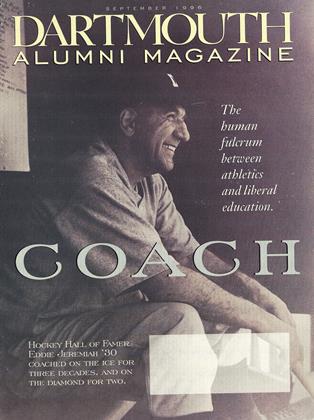HANDTINTING BY KATHLEEN O'DONNELL
IN ATHLETICS, WE CAME OF AGE. We learned what we could get away with, or how deep we could go inside. We busted our butts or coasted, were cocky or scared to death. We got kicked out of practice, put on the bench, chewed out in front of our teammates. We sat injured or played in pain. We were cheered and felt like heroes for brief, glorious moments. We picked our teammates up, let ourselves down. Some of us quit. So much of ourselves was exposed.
Watching us all—pushing us, praising us, teaching us, knowing us better than any other adults possibly could—were the coaches. Unlike classroom teachers, coaches came to know our bodies and our minds, and had so many more ways of judging us. They watched us respond to pressure, determined which of us could be leaders, saw us naked, knew without words what we were made of. In return, we revered them, feared them, loved and hated them. Their power was directly related to our vulnerability, our identity, our dreams. Is it any wonder they affected us so profoundly?
Could we know then that, all these years later, we would look back on our coaches as models of integrity or passion? That we had learned lessons and habits that went way beyond the playing fields? That we would remember a bare comment of approval as something that changed us forever?
On the following pages are stories about coaches at Dartmouth what they taught, what they represented. In each of the stories we see a relationship between two people, and something more: a glimpse of the relationship between athletics and the liberal arts.
 View Full Issue
View Full Issue
More From This Issue
-
 Feature
FeatureThe Language of Innocence
September 1996 By KATE COHEN '92 -
 Cover Story
Cover StoryBAKER WAS THE BACKDROP
September 1996 -
 Feature
FeatureStaying Clear
September 1996 By Jeanet Hardigg Irwin '80 -
 Feature
FeaturePassion
September 1996 By Fiona Bayly '89 -
 Feature
FeatureConfidence
September 1996 By Paid Tsongas '62 -
 Feature
FeatureFaith
September 1996 By Seward, "Pat" Brewster '50
JIM COLLINS '84
-
 Cover Story
Cover StoryMENTOR
NOVEMBER 1991 By Jim Collins '84 -
 Article
ArticleThe Lost Season
October 1992 By JIM COLLINS '84 -
 Cover Story
Cover StoryThe Making of a President
SEPTEMBER 1998 By Jim Collins '84 -
 Cover Story
Cover StoryANDREW WEIBRECHT '09
JANUARY | FEBRUARY 2014 By JIM COLLINS '84 -
 PURSUITS
PURSUITSArt of Glass
JANUARY | FEBRUARY 2020 By Jim Collins '84 -
 Sports
SportsMoneyball
NOVEMBER | DECEMBER 2021 By JIM COLLINS '84








